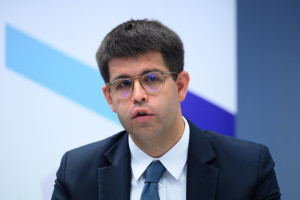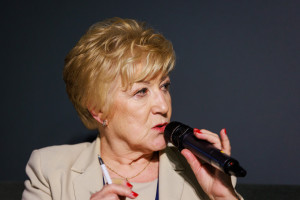Medical self-government: there is no comprehensive reform strategy and there is no consent to sham actions

 Author: Beata Pieniążek-Osińska • Source: Rynek Zdrowia • Added: July 30, 2025 14:00
Author: Beata Pieniążek-Osińska • Source: Rynek Zdrowia • Added: July 30, 2025 14:00
For many years, there has been a lack of a comprehensive reform strategy, preceded by a thorough analysis that would define the goals, implementation stages, and impact of changes on patients, medical staff, and healthcare facilities, according to the Presidium of the Supreme Medical Council. It emphasized that it will not accept "sham actions that do not serve the well-being of patients or the safety of physicians." It presented a long list of expectations.
- For many years, there has been no comprehensive reform strategy, preceded by a reliable analysis that would define the goals, implementation stages and effects of changes on patients, medical staff and healthcare facilities - says the Presidium of the Supreme Medical Council
- In its latest position, it firmly emphasizes that it will not accept "sham actions that do not serve the good of patients or the safety of doctors"
- PRNL presented a long list of expectations, including medical safety, system financing, and medical staff training.
The Presidium of the Supreme Medical Council expressed "deep concern about the current state of the healthcare system."
In its latest position, it assesses that "the reform proposals presented by the Ministry of Health so far, the directions of action and media announcements seem inconsistent, ad hoc, and, moreover, do not fully correspond to the actual needs of the system."
- For many years, there has been no comprehensive reform strategy, preceded by a reliable analysis that would define the goals, implementation stages and the effects of changes on patients, medical staff and healthcare facilities - he assesses.
As the local government emphasizes, many appeals from the medical community to the Ministry of Health remain unanswered or – despite being well-received – are ultimately not implemented.
In the opinion of the National Health Fund (PNRL), the actions taken in the area of professional safety of doctors and other healthcare workers are particularly disappointing. Despite the tragic events that affected representatives of the medical community, and despite the declarations of the Ministry of Health about the need to implement a package of legal changes strengthening the protection of medical personnel, the necessary changes have not been implemented.
Moreover, it points out that "the medical self-government's demand to limit the application of criminal sanctions against medical workers – including doctors – for unintentional acts against life and health committed in connection with the provision of health services remains unfulfilled", i.e. the so-called greater good clause .
According to the Polish Medical Council (PNRL), there is also a lack of a coherent policy for training medical personnel and the repeal of regulations that provide for the possibility of acquiring licenses to practice medicine and dentistry in Poland through simplified procedures. Another unresolved issue for years is the financing of healthcare services, and the Ministry has not yet presented a coherent concept for financing healthcare based on the actual health needs of society.
A thorough reform and a long list of expectationsHealthcare in Poland has undoubtedly required a thorough reform for years, encompassing systemic measures in the areas of financing, organisation of service provision, access to services and prevention.
The Presidium of the Supreme Medical Council expects the Ministry of Health to:
- Presenting a clear, multi-year healthcare reform strategy covering the organisation and financing of service provision, based on solid substantive foundations and current demographic and epidemiological data.
- Immediate implementation of solutions to improve the level of protection of medical personnel, including ex officio prosecution of all manifestations of aggression, creation of an aggression register, standardization of procedures for responding to violence, and penalization of disruptions of public order in medical facilities.
- Extending the legal protection afforded to public officials to all medical workers, regardless of the place and form of practice.
- Implement legal solutions that limit physicians' criminal liability for acts committed unintentionally, where the physician cannot be held responsible for a gross breach of standards – the so-called greater good clause . Unintentional medical failures should not result in criminal liability for physicians, except in situations where the act resulted from a gross lack of care. The constant increase in pressure on physicians' criminal liability leads medical professionals to adopt legally sound attitudes, but not necessarily those that are best for improving patient health. The willingness to pursue training in specialties that are crucial to population health and where the risk of therapeutic failure is higher (e.g., surgical specialties) is decreasing.
- Simplifying drug reimbursement rules and removing physicians' responsibility for determining reimbursement levels . The Ministry of Health committed to implementing this demand in writing in February 2018, in an agreement ending the resident physicians' protest.
- Guaranteeing the quality of medical education , including appropriate standards, staffing and infrastructure requirements for universities.
- Elimination of the so-called simplified modes of access to the medical and dental professions, in which access to patient treatment is granted to persons whose diploma and training program are not subject to prior verification for compliance with the minimum requirements in force in the European Union.
- Effectively combating disinformation in healthcare and the promotion of pseudoscientific treatment methods, as well as curbing the activities of people providing healthcare services who do not have the necessary qualifications and skills, or who even impersonate doctors, who, as a result of their actions, harm seriously ill patients and put their health and lives at risk.
- Regulating the provision of aesthetic medicine services, including the qualifications of medical personnel necessary to perform specific procedures while ensuring the safety of those who use these services. The lack of clear legal regulations, including those specifying which procedures can only be performed by a physician or dentist , creates the false impression that services are legally provided by unauthorized individuals who have only completed a course or training.
- Effectively combating the uncontrolled activities of companies offering access to prescription drugs through so-called prescription machines , including by developing standards for teleconsultations and enforcing their compliance.
- Introducing mechanisms to limit access to psychotropic drugs so that they are only available to people whose health condition justifies the use of these drugs.
- Implementation of central e-registration , which still does not function as a universal and fully integrated system.
- Effective publicity of preventive programs , clear and understandable and broad communication about the services available to patients.
- Regulating problems related to the financing of services , their valuation and ensuring full access to preventive and dental services.
The medical self-government expects that the tasks indicated above, as well as other issues in the area of health care, will be undertaken and implemented in dialogue with the medical community.
It is also about maintaining the highest standards of public consultation when creating legal acts.
"It is also expected that the voice of the medical self-government will be actually reflected in the content of the final legal regulations," the PNRL emphasizes.
As the local government summed up, "it has been known for years that the healthcare system in Poland requires not only ad hoc solutions, but also a wise, coherent and consistently implemented policy."
The NRL Presidium declared its readiness to cooperate with the Ministry of Health, and at the same time "firmly" emphasized that it will not accept "sham actions that do not serve the well-being of patients or the safety of doctors."
Copyrighted material - reprint rules are specified in the regulations .
rynekzdrowia












